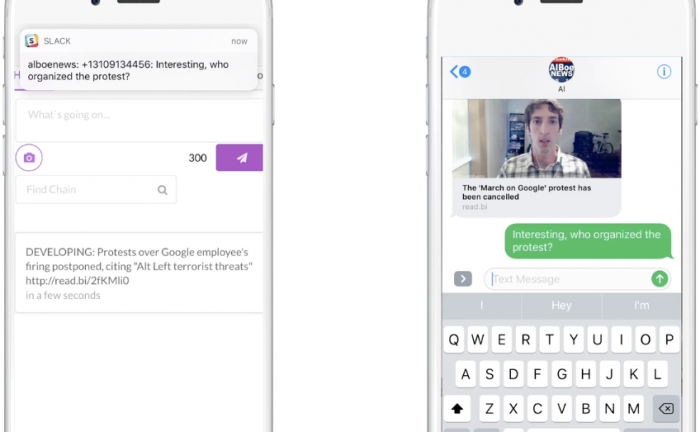
Now, it’s leaving its Facebook Messenger offering by the wayside, and refocusing on building out its text messaging platform for individual creators, who set a fee for subscribers to their text channel — something of a stripped-down Patreon, based in SMS. Purple had decided to shift most of its services to Facebook for cost and technical reasons, but then it saw Messenger become a vast space littered with various impersonal bots.
“Facebook Messenger was great in a lot of ways. It’s free — which is big — the UI gives you more flexibility, you can use its buttons, there’s more functionality. But we heard over and over from users that it’s just not as personal,” Harris said. “One person described it as, ‘I text with my friends and family. On Facebook Messenger, I message with the people I’m not close enough to actually give my number to.’ I think that sums up a lot of people’s relationship with Messenger.”
“You’re also met with the obstacle of making sure people understand you’re not actually a bot, because people have a lot of mediocre to bad experiences with Facebook Messenger bots,” she added. “It takes more convincing than we’d like that there’s a real human on the other end.”
The new Purple service, now in private beta, is aimed largely at journalists with large personal followings on social media already. After beta testing, the platform will open up to anyone interested in creating a channel for paying subscribers — creators set their own prices starting from $3 per month — and readers come to the platform to search for people they want to follow and financially support. A portion of that potential revenue goes to covering messaging costs and fees for the payment system Stripe, which Purple uses to process subscriptions; creators will likely end up with about 60 to 70 percent of the money their readers pay, according to Harris. Cofounder David Heimann built the rest of the platform in-house.
“We envision that, in the future, Purple will be a place where you go to find the best sources to follow and directly subscribe to on any topic, built to help people go much deeper with each individual source,” Harris said. “I don’t think we’ll see any member being subscribed to more than a handful of Purplers, as we’re calling the content creators. You’re subscribed to a few. Those are your experts, your go-to people.”
One channel has already launched: a $5-per-month news alert service run by one of the original members of the Breaking News team (before it was sold to, then eventually shut down by, NBC News). Purple had reached out to Al Boe and his team to start a channel for breaking news updates, Boe said — plus he was already a past Purple user. For the price, his subscribers get around five “can’t miss” news alerts, with customization options to come, and direct access via text to the news service staff. The price is based on “what I had been charging for a premium type of service that I was handling through Patreon,” according to Boe, and he also shifted his Patreon supporters over to Purple.
We are sending out regular updates to our text subscribers on Hurricane #Irma, as well as North Korea. Sign up at https://t.co/meHFu8m8qa
— Al Boe BREAKING NEWS (@AlBoeNEWS) September 5, 2017
“We encourage our subscribers to text us back with any questions or feedback, and we will text them right back. The questions don’t even have to be about a story we’ve covered,” Boe wrote in an email. “News consumption is no longer one-sided, and it provides an even more personal connection than one you can get on a service like Twitter.”
Purple’s platform collects all the texts users send and displays them in a dedicated Slack, from which creators can track and respond to all incoming questions. The platform also tracks analytics like churn, retention rate, clickthrough rates of links, and will work with beta testers to figure out what other tools they might like to have on the backend.
“There are different tools out there that people are using to duct tape solutions together,” Harris said, pointing to Jamelle Bouie’s and Sam Harris’ newsletters. “We have the whole payment flow set up for you. We give you a way to manage membership. We give a compelling value proposition to the audience, which boils down to exclusive engagement through text.”